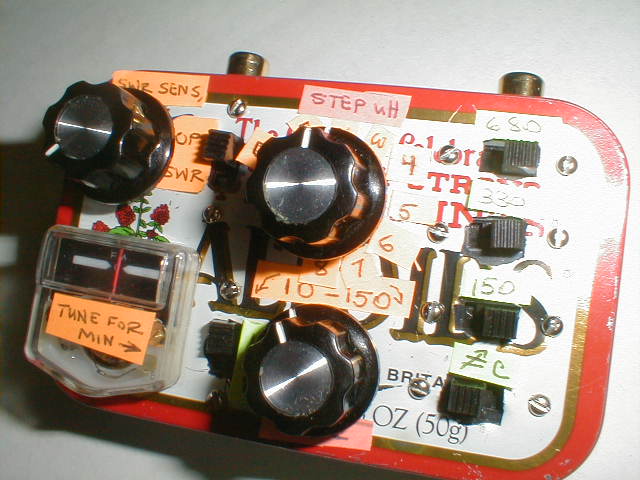 Click picture for full size image
Click picture for full size image
May 5, 2001
(updated 5/8/01 for typos)
 Click picture for full size image
Click picture for full size image
This project started some time back because has much as I like my LDG QRP autotuner (the old one with non-latching relays) I hated to haul it and a 1 aH gell cell around just to power it. It's great for just pushing the tune button or leaving it in automatic and changing bands with the rig but it's big and relatively heavy.
I have had L-type tuners (manual ones) in the past for the station but nothing small and light. So my search was for something small, light and flexible.
My main field antenna is the W3EDP 87 ft end fed longwire with 1/4 wave ground counterpoise. I found too many restrictions with trying to use the 16 ft one that's always mentioned. My tuner's seem much happier with a 1/4 wave insulated wire counterpoise just laying on the ground. BTW the 87 ft length is not too critical either but generally makes a fairly consistent impedance match for L-type tuner is the low-Z mode (i.e. cap on the antenna side of the var. inductor. I have used antennas as short as 21 ft with the same tuners and worked OK with 3-5 watts.
So I generally know the antenna type and counterpoise situation end fed with 1/4 wave counterpoise.
Next the packaging. My goal was to build the tuner in something the size of the famous QRP enclosure "the Altoids Box" but I had two other hopes to complicate things.
First I wanted to be able to protect the rig somewhat by limiting the SWR that it would see regardless of what the antenna situation was (i.e.. the extremes being disconnected or shorted to ground). The resistor bridge addresses this problem and there have being many versions published in the past. I use a hybrid of the "A Simple LED SWR Bridge" by G0WQR in Spart 93 and the SWR bridge in the Shara 4 transceiver article by Wayne Burdick in QEX some years ago (before the Sierra).
I wanted to use a small cheap meter I had so opted the meter instead of the LED. But the LED versions seem to be fine too and if I don another version of this I'll go for the LED option.
I used the DPDT switch to place the SWR bridge into the antenna line before the tuner or bypass the bridge. So once you're tuned up you can eliminate the 6 - 8 dB signal introduced by the bridge.
The L-tuner arrangement is the simple multi-inductor (in series) and a set of capacitors that can be added to the input or output side of the inductor string.
 AT - L Tuner Schematic (click on picture for full size)
AT - L Tuner Schematic (click on picture for full size)
Since I wanted a very small tuner I elected to use T50-2 and T50-6 type toroids to set the values of the 8 inductors in the series. My LDG QRP tuner manual provided a schematic of their tuner and a list of components values for the inductors and capacitors. Since I have been using these tuners for years and having great success with them I thought their values would be a good place to start.
A single pole multi-position rotary switch selects the inductor point relative to the antenna end (values range from 0.1 uH to about 20 uH) depending on switch position. One position is reserved for a 51 ohm 2 watt composite resistor to serve as a dummy load in conjunction with the other three bridge resistors.
For the capacitors I elected to used a mini-var. cap (10-150 pF) and three additional fixed caps that could be switched in to change the effective cap value (ie 10 pF - 1000 pF currently).
Here's an open enclosure view to show the main components. the bridge circuit is an a small Demel etched isolated pad board above the SWR sensitivity POT.
So the resistor SWR bridge can be used with an external antenna or tuner (i.e. balanced) with the inductors and caps switched out of the rig to antenna path.
For this version I decided to keep things simple and used a SWR sensitivity POT, inductor switch and var. cap with small shaft knobs for adjustment. These could be made smaller to take up less space and weight.
Well the results are very good:
The unit weights 5oz
Fits into an Altoids Box
As resistor bridge with meter SWR indicator
Consumes no power
Heading back to the Appalachian Trail soon and will let you know about results.
72's Sam AE4GX North Georgia
QRP club, Atlanta, GA